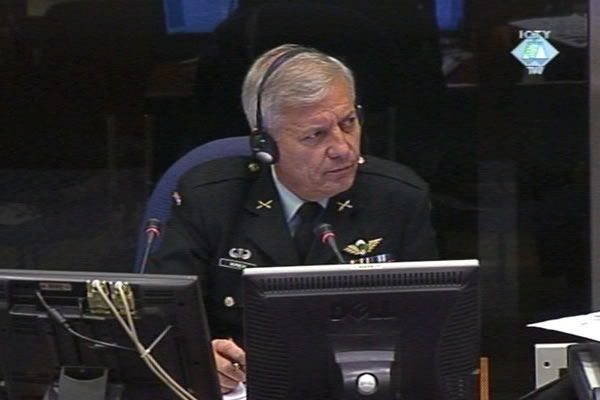Home
ARMY AND POLICE DIDN’T WANT WITNESSES
Describing the situation in Krajina during Operation Storm, former commander of the UN Canadian Battalion says the Serbian houses were systemically looted and burned down ’day by day, four weeks in a row, non-stop’. During that time, both the Croatian army and the police did nothing except to restrict the movement of UN personnel since they didn’t want to ’have them as witnesses’
 Jacques Morneau, witness at the Gotovina, Cermak and Markac trial
Jacques Morneau, witness at the Gotovina, Cermak and Markac trial Colonel Jacques Morneau, former commander of the UN Canadian Battalion deployed in Sector South, in Krajina, was on vacation in Greece when Operation Storm was launched on 4 August 1995. The Canadian colonel cut his vacation short and boarded the first flight back to Zadar. There he found a group of his soldiers who had been captured by the Croatian Army. In his evidence as a prosecution witness at the trial of generals Gotovina, Cermak and Markac, Morneau said that forty-three Canadian soldiers were captured at the eight of a total of sixteen observation posts in his battalion’s area of responsibility. According to him, that was the indication that Croatian forces wanted to avoid any kind of international monitoring of the situation.
When he returned to his base in Rastavic near Benkovac he learned that there was a strict restriction of movement for Canadian soldiers at the remaining eight observation posts. He had seen Serbian houses being looted all over the area, by soldiers and civilians alike. Nobody did anything to prevent them from doing this. Describing the situation in August 1995, Morneau recounted that ’looting went on day by day, four weeks in a row non-stop’. He believed that houses were systematically burned down; some were set on fire several times.
In the statement he gave to the OTP investigators the witness said he believed that the Croatian authorities ’turned a blind eye, ignoring the systematic looting and destruction’. As he said, the movement was restricted only to UN personnel because neither the army nor the police ’wanted them as witnesses’. Contrary to that, the movement of persons who took away the looted property of Krajina Serbs was not restricted. At the end of the examination-in chief, the witness said that he was sure that there would have been no looting and burning had there been clear orders to prevent such behavior.
Three statements the witness had given to the OTP investigators were tendered into evidence together with a photo of a body of an elderly Serb civilian found by Morneau and his soldiers on 10 August 1995 inside their area of responsibility. Before they discovered the body, they saw the old man at a Croatian civilian police check point; he had been detained there. A video recording taken by a Canadian Battalion liaison officer was also tendered into evidence. The footage shows a village almost completely burned down. Colonel Morneau, however, was not able to tell which village it was.
Ante Gotovina’s defense counsel focused for the most part of his cross-examination on proving that it was not possible to prevent looting in such a vast area with a limited number of soldiers. Serb properties were looted mostly by Croatian returnees, he notes. They had been expelled from that territory a few years before and their property had been also looted. The witness didn’t comment on the claim that it was in fact the ’return of the property’, rather than looting. He did say that the Croatian armed forces had enough check points to prevent this.
Linked Reports
- Case : Gotovina et al. - "Operation Storm"
- 2008-05-28 HOW MUCH IS ’HUNDREDS AND HUNDREDS’?
- 2008-05-28 CROATIAN SOLDIERS WERE ONLY INHABITANTS IN KISTANJE
- 2008-05-23 DEFENSE: CIVILIANS RESPONSIBLE FOR CRIMES
- 2008-06-02 CROATS WERE THE SAME AS SERBS
- 2008-06-03 GENERAL FORAND’S PROTESTS WERE IN VAIN
- 2008-06-04 ‘CORDIALITY AND CIVILIZED BEHAVIOR’ YIELDED NO RESULTS
